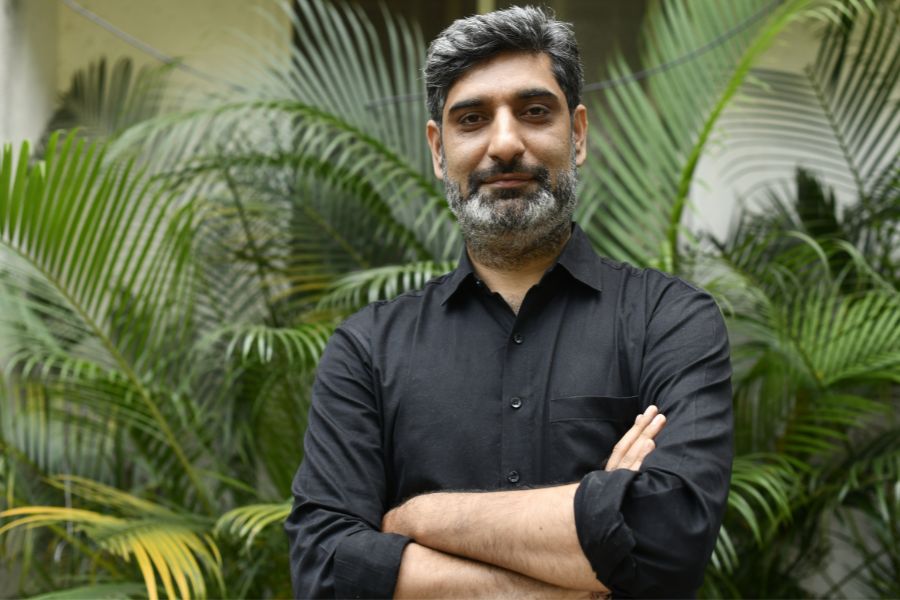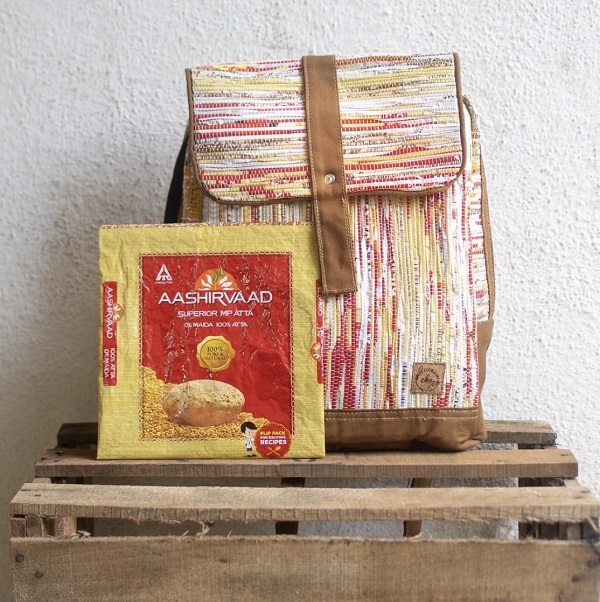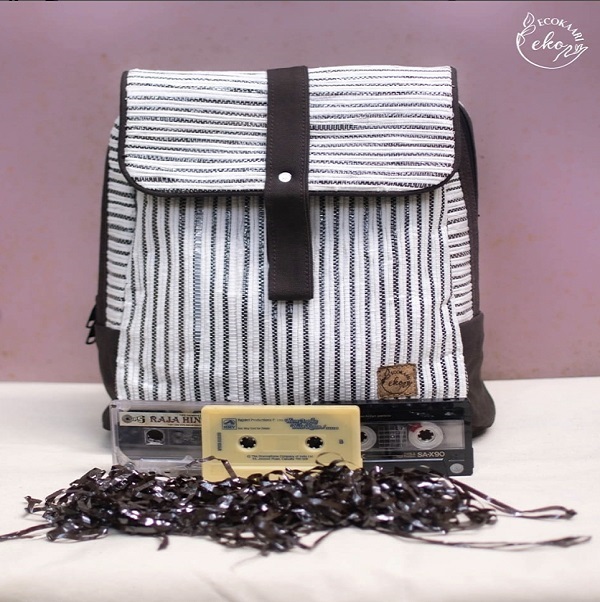Upcycling: Redesigning waste plastic into higher-value products
India generates an enormous amount of plastic waste, with inadequate infrastructure for proper disposal and recycling leading to a threat to the environment and human health. The government has taken several steps to address the issue such as ban on single-use plastic in certain regions and promoting recycling initiatives. But, more comprehensive and stringent measures like increased awareness and improved waste management systems are required to effectively combat this growing problem.
EcoKaari is one of the leading plastic upscaling companies dedicated towards eliminating single use plastic by upcycling it to trendy handbags and accessories. India Business and Trade spoke exclusively to Nandan Bhatt, CEO and Founder, EcoKaari to find out traditional and eco-friendly techniques and procedures used to up-cycle plastics as well as the challenges faced by the company.

IBT: What inspired you to up-cycle plastic wrappers and how did you come up with the idea of embedded traditional weaving method as a modern innovation?
Nandan Bhatt: The inspiration behind our use of plastic wrappers originated from Kashmir. When I moved to Mumbai in the late 90s for education, I went on trekking with friends. We noticed how trekkers and travellers were littering, leaving beautiful places filled with garbage and no one to clean it up. Despite the challenges of retrieving waste from mountainous areas, our group of friends brainstormed solutions to address this issue. While we observed people collecting plastic and glass bottles in those locations, there was no one collecting used packets as there was no market for them.
Back in 2013-14, I began working as a CSR consultant. During one of our travels in Gujarat, particularly in Kutch, we came across an ongoing project led by an NGO. However, we realized that the project lacked proper marketing and needed to be taken to the next level.
The major challenge we faced with this venture was the lack of subsidies. We were uncertain about the feasibility of selling this idea, considering its limited commercial sustainability. Despite this, we set specific targets, trained our artisans, and embarked on teaching initiatives to kickstart the project.
IBT: What other challenges did the company face during its initial stages?
Nandan Bhatt: The world of startups and entrepreneurship often seems glamorous, but apart from regular challenges like cash flow, which every start-up faces, we faced different challenges. The major issue that we faced was getting plastics in the right form.
In India, it is common for households to hand over their garbage to garbage pickers in the morning without segregating the plastic from food waste. As these garbage pickers collect waste from around 200-300 houses per day, the garbage ends up being dumped in a manner that makes it nearly impossible for conventional recyclers to process, given its high level of contamination.
After the pandemic, it has become riskier as plastic is available everywhere but is not in the right form. So, we have to work with waste pickers and wholesalers to provide us with collected, segregated and washed plastic. So the first challenge we still face is getting the plastic.
The second problem that we faced was convincing people to work with us, since weaving in India is done by the community, making it difficult to convince them to work with us. Thirdly, convincing the customers to purchase the product was a huge task.
IBT: How does your company procure plastics and what guidelines are followed? Are there any quality checks?
Nandan Bhatt: Starting from the source, we have identified four major sources of plastics. The first one is obviously waste-picking organizations that work with waste pickers since it is far better to collaborate with them rather than doing it ourselves.
Secondly, we get a lot of donations from across India including Ladakh, Nagaland, Manipur and Southern states as well. We get 15-20 parcels per day with quantities varying from 100 grams to 10 kg. Thirdly, there are food manufacturing companies like ITC, Nestle and Parle G who are working with us.
For example, if Nestle missed the barcodes or batch codes in Maggi packets, they can’t use them as they have strict regulations. In that case, they give the plastic to us for up-cycling. Across India, there are lots of wholesalers of plastic who provide us with the raw material although we don’t do quality check there.
We have tied up with another organization that makes fuel out of it. There is a process called Pyrolysis where the plastic is heated until it breaks down into its original form. They take the waste that we cannot use, although it is difficult to do the quality check at their end, so we do it on our own.
IBT: Is there any expiry date for the plastics? If the quality of the plastic is not good do you discard it? What kind of segregation do you do in that case?
Nandan Bhatt: If plastic becomes brittle, we know that it has been used a lot and will break down, so we cannot use it. Secondly, the plastic is segregated into two levels – one is based on gauges and the second is colour. Plastic bags come in different gauges like grocery bags and shopping bags. On the basis of gauges, we have to separate the plastic as we cannot use two gauges in one fabric. Secondly, plastic comes in various colours, so segregation has to be done on that basis, since we do not use any chemicals in our process. Apart from stitching purposes, we do not use any heat or chemicals in the process.
IBT: So, what is the cycle of the plastic till it becomes a usable bag? Please explain the complete process.
Nandan Bhatt: The process is quite simple, it starts with procurement and segregation of plastic as informed earlier. Once the plastic is selected, it is washed with herbal cleaners and then dried under the sun for one or two days. After that, we segregate it on the basis of gauge and colour and cut it into long strips. Those strips then go down the charkha to turn into handloom.
IBT: What are Ecokaari’s major achievements till now and what are your future plans?
Nandan Bhatt: In the last 26-27 months, we have upcycled around 50 lakh plastic bags. This year alone, we are expected to cross the 50 lakh mark. We also started a new unit last year in Karnataka with the help of the GSW foundation. We have gathered around 75 artisans there and have already trained them. We have started teaching them as well about selling these products.
I am planning to establish them as a corporation in Pune. Currently, we have a small unit consisting of 20 artisans and 5 managers, and the entire operation is funded by me.
IBT: So what are your future plans? How can the government help you with the sustainability project?
Nandan Bhatt: I will talk about the future plans and the government part individually since I have not worked with the government so far, although there are some pockets where the government is getting involved. About the future plans, this year, we have started with GSW in Karnataka, which I already mentioned.
Currently, we are on the verge of collaborating with four companies, so there will be four more locations coming up across India and one might be abroad – either Nepal or the US. Similar to the project in Pune, our team will visit there to teach them and to create competition across India.
That’s the only way to create an impact since there is no need for heat or energy. One can create clothes from Charkha as well, making it feasible to use in villages and remote areas where there is no electricity.
As of the government support, we got recognized last year under the Swachhata challenge. We topped thirty startups and received a grant of Rs 20 lakh as well. This year, we got incubated with the Institute of Rural Management Anand (IRMA). They took us to Lal Bahadur Shastri National Academy Of Administration (LBSNAA), Mussoorie to talk about eco curriculum. This year, they are testing the project on a small scale, which will include skill development as well as marketing part.
IBT: In terms of challenges in sales and distribution, you have both retail sales and corporate lines. What are your business strategies to collaborate with them?
Nandan Bhatt: I was interested in becoming a B2C brand, but the issue with plastic up-cycling is ‘changing colours’. Since the company deals with waste, we have no control over the colour of the final product. It can come in assorted colours, which can become a problem with B2C. So, we decided to shift our focus to B2B, keeping that B2C channel open, since it gives recognition with an increase in sales. As of B2B, we are receiving a large number of orders, as the corporate is shifting from cheap Chinese items. We have received a lot of responses from Europe as well as Asian countries like Singapore, Japan and Malaysia.
IBT: Currently, EcoKaari is manufacturing bags, wallets and other items for customers. How do you plan to expand your product line?
Nandan Bhatt: We are trying to create competition across the country. In order to do so, we have started selling upcycled fabrics to the designers. Last year, we collaborated with Gaurav Gupta for his collection at the last Lakme Fashion Week. We tried working on shoes as well as sneakers but we don’t want to go into that market as it is a different market altogether.
We are open to making purses and wallets for which we are collaborating with the designers. We have started providing fabric to boutique designers for creating a collective market, as it will only happen if everybody starts selling it.
The government is working towards creating awareness about plastic waste and pollution, but since this is a huge challenge which requires a lot of funding, it can only be done by the government and is not possible for an individual or a company to do it on their own.
Since India is a vast country, only banning plastic will not be enough, but creating awareness about the problem and its solutions can be a game changer. We are so accustomed to using plastic that it is nearly impossible to live without it. Everything from syringes to bottles, is plastic. The vehicles are 30% to 40% lighter because of plastics, using metals will make the vehicles heavy and will burn 40% more fuel.
The truth is, there is no proper solution at this moment. It is a dilemma not just for the Indian government but for the world at large. The only solution at this moment is awareness and disposal of plastic in a proper way, because that will help in recycling 95% of plastic. Every person should know how to recycle plastic at their end. That is all we can do at this moment.
Nandan Bhatt, CEO and Founder, EcoKaari, has over a decade of experience working in the Business Development and Procurement sectors of reputed companies like Tata Telecom, Sony, Future Group and Sify. He, at his heart, is an innovator and has been pivotal in starting and setting up the innovative process of Upcycling Waste Plastic into Sustainable Fabric.















Leave a comment